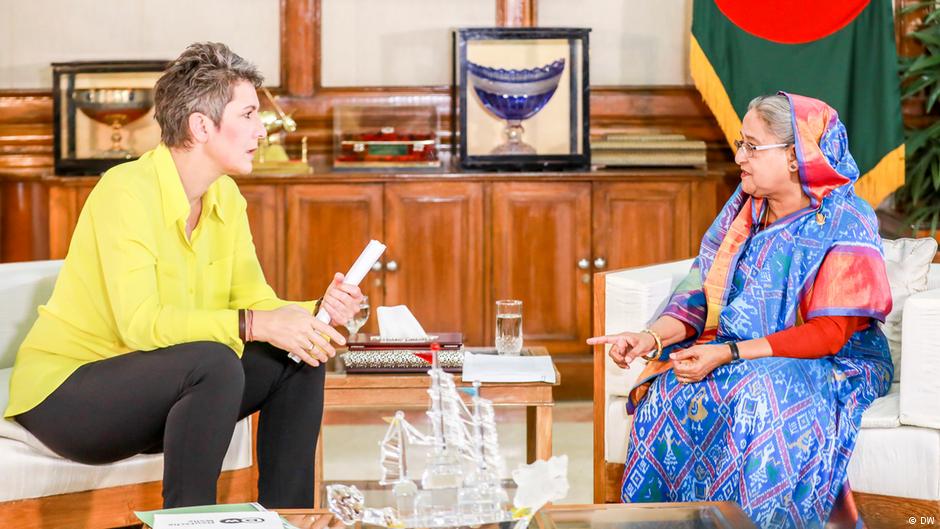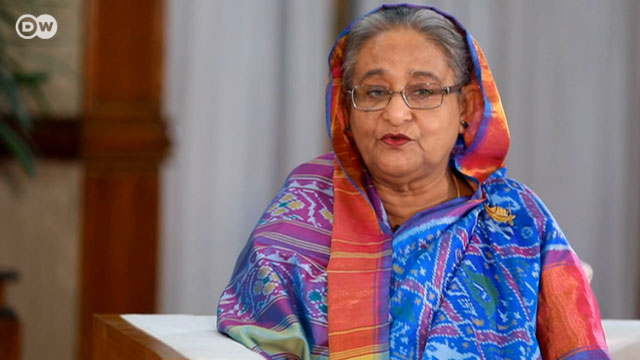In an exclusive interview with DW, Sheikh Hasina indicated that her present — and third consecutive — term could be her last as prime minister of Bangladesh. She said she wants to create room for younger leaders.

Just a month ago, Sheikh Hasina assumed office for the fourth time as the prime minister of Bangladesh.
This is her third consecutive term leading the government of the South Asian nation. In the recently held general elections, her party, the Awami League, and its allies secured 96 percent of the seats in parliament. In her first interview to an international media outlet following her reelection, Hasina confirmed that this would be her last term as premier.
Speaking to DW, she said, "It's the third consecutive term and before that I was prime minister [1996-2001], so it's my fourth term. I don't want to continue for more [time]. I think that everybody should take a break so we can accommodate the younger generation."
Development versus freedom of expression
Burgeoning growth and development have not silenced Hasina's critics, who say she has not done much to ease restrictions on freedom of expression and prevent attacks on liberal thinkers in Bangladesh.
But Hasina said she supported free thought in the country and criticism was only natural. "If you work more you will hear more criticism," she argued, adding, "You should ask my people whether they are satisfied or not, what they think, whether they are getting all they need, whether I can provide this."
Hasina and her Awami League have also been accused of stifling political discourse and trying to establish a one-party rule, a charge the prime minister denied: "This time, Awami League candidates were elected in 260 constituencies [out of 300]. So, other parties are also in parliament. How can it be one-party rule?," she said. According to her, the opposition parties were weak. "If any particular party can't reach people's minds, can't get their trust and doesn't get votes, then whose responsibility is this? This actually portrays their weakness," she told DW.
On Rohingya refugees in Bangladesh
Besides raising living standards and balancing politics between liberals and fundamentalists, Sheikh Hasina's government has also had to take care of over 700,000 Rohingya, who fled from Myanmar's Rakhine state after a military crackdown on insurgents. Most of them now live under deplorable conditions in two camps in Cox's Bazaar district, near the Bangladesh-Myanmar border. This influx has had a serious impact on the region's social and economic fabric, with the newcomers fighting for survival and sometimes competing with locals for space, jobs and limited resources.
The Awami League government has been busy trying to find alternatives for rehabilitating the refugees. Hasina said that her country needs a mid-term plan for the thousands of Rohingya children who were born in refugee camps and for the youth, who are languishing without anything to do. "We have identified an island, where we have created a cyclone shelter and houses. We want to take them there and give them work, so that young men and women can do something and earn money," Hasina explained.
Most of the refugees now live under deplorable conditions in two camps in Cox's Bazaar district, near the Bangladesh-Myanmar border
In order to tackle the problem, Hasina said she wanted to maintain good diplomatic relations with Myanmar and that it was imperative that Bangladesh's neighbors China and India lend a helping hand. The European Union would also need to provide support, she said, above all in sending the refugees back to their country of origin.
"We do not want to fight with Myanmar. We are also trying to cooperate with China and India. But the pressure is increasing on Bangladesh," Hasina told DW, adding, "I think the international community, including the European Union, has some responsibilities (for repatriation). Their responsibilities should not be limited to only providing aid to Rohingya in Bangladeshi camps. Actually the same aid can be provided in Myanmar shelters once they are taken back."-DW
YS





